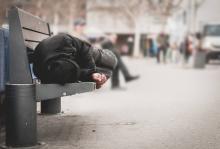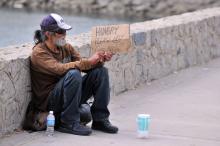criminalizing homelessness

In Matthew 25:35, Jesus identifies himself with the stranger we welcome or exclude. Advent hospitality extends beyond our personal relationships and into the ways we structure our neighborhoods and our common life. But in the United States, our politics are driven by “NIMBYism” (“not in my backyard!”), as housed individuals and politicians not only demand the exclusion of unsheltered people from public spaces but also oppose the creation of shelters and permanent, affordable housing in our neighborhoods.

Creating sacred space, whether in temporary dwellings or permanent homes, is ultimately about constructing community. Community creates safety through mutual care for one another. Often, the political response to unhoused people is instead based on the contrived premise that they are a danger to neighborhoods.

IT IS CRUEL TO PUNISH people for their poverty, but at every level of government, poor people are targeted for unfair treatment under the law. There is perhaps no clearer example of this than the growing criminalization of homelessness in the United States.
The criminalization of homelessness refers to a broad set of policies that punish people for having no indoor homes, such as local laws that prohibit sleeping, sitting, or lying down in outdoor public space. Since 2006, the National Law Center on Homelessness and Poverty (the Law Center) has tracked the explosive growth of these laws, including a 143 percent increase in those that outlaw living in vehicles. This is often the last refuge for poor families, the elderly, and disabled people who have been priced out of the rental market. Today, for example, half of the U.S. cities surveyed restrict sleeping and sheltering oneself outdoors, even when there are no alternative places to go.
Rather than address the root causes of homelessness, such as low wages that have not kept pace with rapidly rising rents, these policies merely punish people for living outside. Meanwhile, people who are sleeping in tents, lying down on sidewalks, and living in their vehicles are doing so because they are too poor to afford other housing. To jail, ticket, or threaten them for it only makes the problem worse.
People brought to jail for living in public often cannot afford cash bail, so they frequently accept criminal convictions to temporarily regain their freedom. They are then released back to the same streets, with the same lack of options, but with new fees and criminal records that make it even more difficult to get into housing and out of public space. This cycle is expensive and wastes community resources that would be better invested in permanent housing and other proven cost-effective solutions to homelessness.

There is no longer a war on hunger in this country.
There is no longer a war on poverty.
There is a war on the hungry.
There is a war on the poor.
It is being waged all over the country with the most recent — and visible — battle coming from Raleigh, N.C., and the now-viral incident with the Rev. Hugh Hollowell’s Love Wins ministries.
It’s ironic, really.
Conservatives love to tell folks that the best way to end poverty, homelessness, and need in our country is through the work and generosity of private individuals and private donations, not through government programs.
The answer, they say, is charity.
Yet in a stroke of cruel hypocrisy, when charities actually address these issues in real life, they aren’t commended for their work.
Rather, they are threatened with arrest.

A growing number of cities across the United States are making it harder to be homeless.
Philadelphia recently banned outdoor feeding of people in city parks. Denver has begun enforcing a ban on eating and sleeping on property without permission. And this month, lawmakers in Ashland, Ore., will consider strengthening the town's ban on camping and making noise in public.
And the list goes on: Atlanta, Phoenix, San Diego, Los Angeles, Miami, Oklahoma City and more than 50 other cities have previously adopted some kind of anti-camping or anti-food-sharing laws, according to the National Law Center on Homelessness & Poverty.